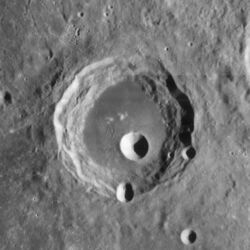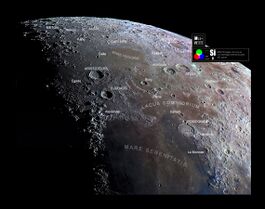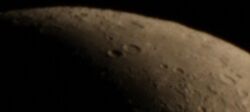Astronomy:Hercules (crater)
 Mosaic of Lunar Orbiter 4 images | |
| Diameter | 68.32 km |
|---|---|
| Depth | 3.2 km |
| Colongitude | 322° at sunrise |

Hercules is a prominent crater located in the northeast part of the Moon, to the west of the crater Atlas. It lies along the east edge of a southward extension in the Mare Frigoris. To the west across the mare is Bürg. To the south is the ruined crater Williams.
The interior walls of Hercules have multiple terraces, and there is a small outer rampart. The crater floor has been flooded by lava in the past, and contains several areas of low albedo. The central peak has been buried, leaving only a low hill near the midpoint. The satellite crater Hercules G is located prominently just to the south of the center. The small crater Hercules E lies along the southern rim of Hercules.
Hercules is a crater of Eratosthenian age.[1]
The name Hercules was formally recognized by the IAU in 1935.[2]
In the past this crater has been reported as the site of some transient lunar phenomenon.[according to whom?]
Satellite craters
By convention these features are identified on lunar maps by placing the letter on the side of the crater midpoint that is closest to Hercules.
| Hercules | Latitude | Longitude | Diameter |
|---|---|---|---|
| B | 47.8° N | 36.6° E | 9 km |
| C | 42.7° N | 35.3° E | 9 km |
| D | 44.8° N | 39.7° E | 8 km |
| E | 45.7° N | 38.5° E | 9 km |
| F | 50.3° N | 41.7° E | 14 km |
| G | 46.4° N | 39.2° E | 14 km |
| H | 51.2° N | 40.9° E | 7 km |
| J | 44.1° N | 36.4° E | 8 km |
| K | 44.2° N | 36.9° E | 7 km |
The following craters have been renamed by the IAU.
- Hercules A — See Keldysh.
References
- ↑ The geologic history of the Moon. USGS Professional Paper 1348. By Don E. Wilhelms, John F. McCauley, and Newell J. Trask. U.S. Government Printing Office, Washington: 1987. Table 12.2.
- ↑ "Hercules (crater)". Gazetteer of Planetary Nomenclature. USGS Astrogeology Research Program.
- Andersson, L. E.; Whitaker, E. A. (1982). NASA Catalogue of Lunar Nomenclature. NASA RP-1097.
- Blue, Jennifer (July 25, 2007). "Gazetteer of Planetary Nomenclature". USGS. http://planetarynames.wr.usgs.gov/.
- Bussey, B.; Spudis, P. (2004). The Clementine Atlas of the Moon. New York: Cambridge University Press. ISBN 978-0-521-81528-4.
- Cocks, Elijah E.; Cocks, Josiah C. (1995). Who's Who on the Moon: A Biographical Dictionary of Lunar Nomenclature. Tudor Publishers. ISBN 978-0-936389-27-1. https://archive.org/details/isbn_9780936389271.
- McDowell, Jonathan (July 15, 2007). "Lunar Nomenclature". Jonathan's Space Report. http://host.planet4589.org/astro/lunar/.
- Menzel, D. H.; Minnaert, M.; Levin, B.; Dollfus, A.; Bell, B. (1971). "Report on Lunar Nomenclature by the Working Group of Commission 17 of the IAU". Space Science Reviews 12 (2): 136–186. doi:10.1007/BF00171763. Bibcode: 1971SSRv...12..136M.
- Moore, Patrick (2001). On the Moon. Sterling Publishing Co.. ISBN 978-0-304-35469-6. https://archive.org/details/patrickmooreonmo00patr.
- Price, Fred W. (1988). The Moon Observer's Handbook. Cambridge University Press. ISBN 978-0-521-33500-3.
- Rükl, Antonín (1990). Atlas of the Moon. Kalmbach Books. ISBN 978-0-913135-17-4.
- Webb, Rev. T. W. (1962). Celestial Objects for Common Telescopes (6th revised ed.). Dover. ISBN 978-0-486-20917-3. https://archive.org/details/celestialobjects00webb.
- Whitaker, Ewen A. (1999). Mapping and Naming the Moon. Cambridge University Press. ISBN 978-0-521-62248-6.
- Wlasuk, Peter T. (2000). Observing the Moon. Springer. ISBN 978-1-85233-193-1.
 |




